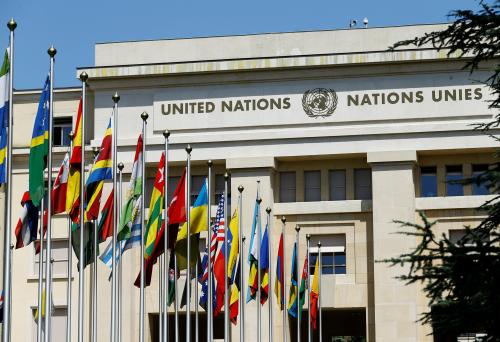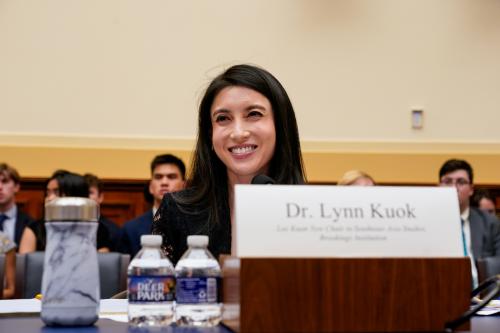To commemorate the 70th anniversary of the passage of the Marshall Plan, U.S. Agency for International Development (USAID) Administrator Mark Green, Brookings President John Allen, and CARE USA President and CEO Michelle Nunn discussed its history and the lessons that apply to U.S. global leadership today, in a conversation that I moderated.
The commemoration was timely, as it came at the end of the 50th Tidewater retreat of the development ministers of the OECD, first convened in 1968 by the United States to coordinate leadership among aid donors—most of whom are former recipient countries of the Marshall Plan.
Five key themes emerged from our discussion on U.S. global leadership today:
Ambition matters
The designers of the Marshall Plan were seeking to meet immediate needs, but also looking 100 years out. The U.S. provided $13 billion from 1938-1942 (roughly $140 billion today), exchanged technical know-how, and facilitated policy reforms. The plan also helped create a post-WWII architecture of cooperation that continues today.
Global development serves US strategic interests
The case for the Marshall Plan was strengthened because it advanced democratic ideals and freedoms to counter the spread of communism. Today’s U.S. global development engagement also offers countries a clear choice from the “lure of authoritarianism” and transactional approaches offered by China and others.
The US must lead with strategic values
Success depends upon the U.S. clearly projecting its values, including respect for human rights, the rule of law, and non-corrupt governance. These make the U.S. “uniquely capable.”
Support from the American public is there for the asking
The generosity of U.S. citizens complemented the investments of the Marshall Plan, as they sent care packages and other assistance abroad. It remains critical to communicate directly with the American public about the value and success of U.S. engagement overseas, and invite them to be active participants and partners in the development enterprise.
Uncertainty is also opportunity
While the Marshall Plan is now lauded as one of the greatest foreign policy successes of the U.S., it was initially met with considerable skepticism from policymakers and citizens alike. We should not think it will be easy to solve the development and humanitarian challenges of today, but the Marshall Plan demonstrates that real success is possible, even starting from a place of difficulty and uncertainty.
Secretary of Defense James Mattis has talked powerfully about U.S. foreign policy being grounded in the “power of intimidation,” a reference to the strength of the U.S. military, as well as the “power of inspiration,” a reference to the work of USAID, the Millennium Challenge Corporation, the Department of State, and other U.S. agencies that provide development and humanitarian assistance. The lessons from the Marshall Plan highlight the importance of leveraging that “power of inspiration,” and demonstrate that the level of ambition, engagement with the U.S. public, and projection of U.S. values are critical to its success.
View the full event webcast here.
The Brookings Institution is committed to quality, independence, and impact.
We are supported by a diverse array of funders. In line with our values and policies, each Brookings publication represents the sole views of its author(s).







Commentary
Applying the lessons of the Marshall Plan to US global leadership today
June 21, 2018